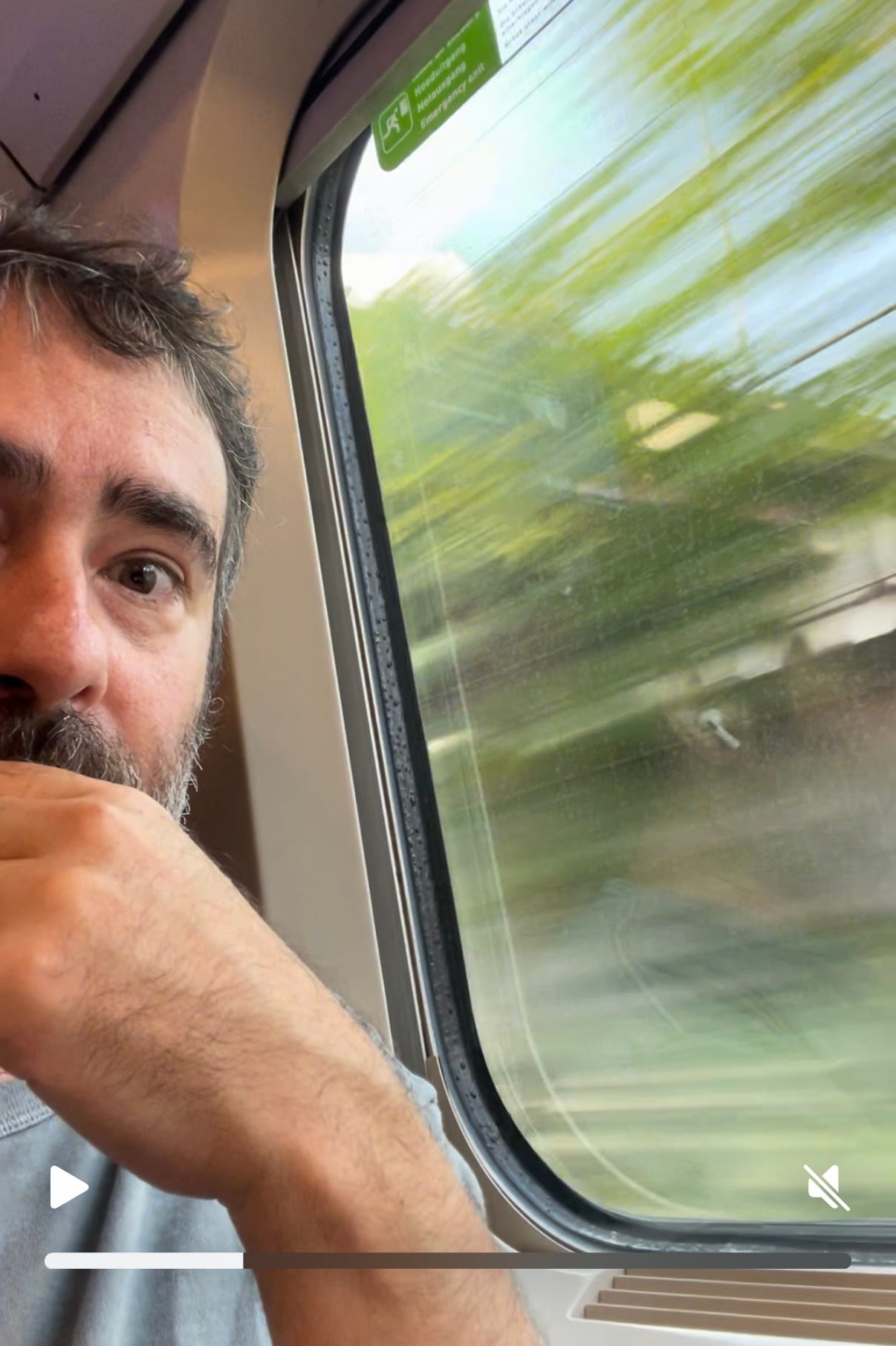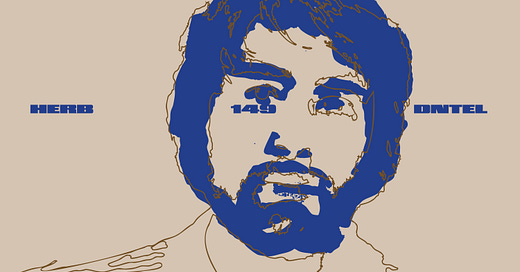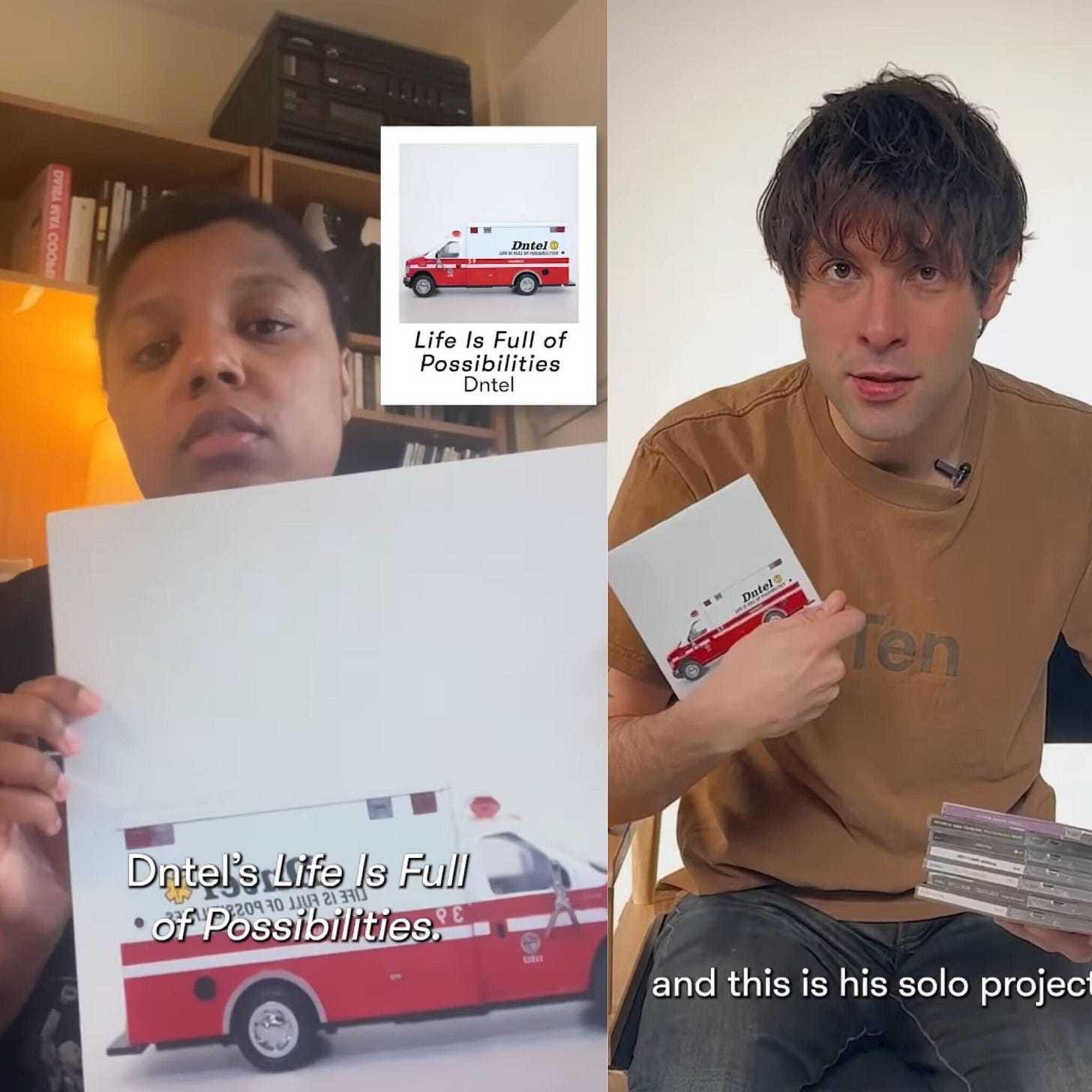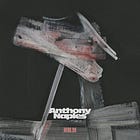Herb Sundays 149: Dntel
The singular Los Angeles producer Jimmy Tamborello (Dntel, The Postal Service, Strictly Ballroom) delivers the "twinkly, gentle, and cozy." + Enya, happy accidents, and more.
Herb Sundays 149: Dntel
Playlist: Apple Music, Spotify
Art by Michael Cina
“Sunday mornings at home for me means sounds that are twinkly, gentle, and cozy. I love sad stuff the most but I’ve tried to keep this mix more on the uplifting side of things. There are some all time favorites mixed in with stuff I’ve just found recently along with whatever else fit into the flow… not recommended for the car!”
-Jimmy Tamborello for Herb Sundays
Jimmy Tamborello has been making and releasing electronic music under the Dntel (“Din-tel”) moniker since 1994, releasing records on such fêted labels as Sub Pop, Morr Music, DJ Koze’s Pampa, MatthewDavid’s Leaving Records, among others. His bonafides are wide-reaching, of course as The Postal Service, but also as part of ‘90s band Strictly Ballroom, member of techno-pop group Figurine, one-half of experimental synth outfit Sana Shenai, and host of a very long-running weekly internet radio show on the great Dublab station called Dying Songs where he shares his extraordinary and always growing record collection.
I came to know Jimmy’s music through his breakthrough Dntel album Life Is Full Of Possibilities (2001), which I’ve wanted to write about here for a while, and Jimmy was kind enough to bless us with a fantastic mix today. Arriving via the influential Los Angeles Plug Research label, Possibilities… was one of a handful of amazing albums on the label that helped surface artists such as Daedalus, Flying Lotus, John Tejada, and others.
Quality American-made and album-led electronic music was in short supply even after the “electronica” boom apart from DJ Mix CDs or rare miracles like Carl Craig’s (Herb 08) More Songs About Food and Revolutionary Art (1997), though a new underground had been stirring. Although experimental electronic music, or “Intelligent Dance Music” was thought of as purely an English or European concept, the new wave of labels like Miami’s Schematic (which got a lot of air time in Nick León’s Herb 140 write-up) and Merck, Chicago’s Hefty Records (Telefon Tel Aviv, Savath + Savalas (aka Prefuse 73 and co.), and LA’s Plug Research’s and others documented local and imagined scenes, inspired labels like Ghostly, and forged connections abroad as well.
You’d be hard-pressed to find much evidence of this on paper though, as while these labels helped build cult audiences, many of these acts largely remained below the fold of their European contemporaries, though occasionally some would surface but usually by virtue of signing to an international label (Caribou, then called Manitoba, on Leaf and Prefuse 73 on Warp). Dntel quietly released Possibilites… which must have been reviewed by Pitchfork as it made their best of the year list, but don’t see one until its reissue in 2011 (a shit sandwich write-up the editors fortunately paired with a good score), into the wilderness, with its penultimate track, the breathless smoke-alarm dreamscape of the Ben Gibbard collaboration “This is the Dream of Evan and Chan” which is not only great as a Postal Service origin story but just an incredibly good song and a bid for the potential for electronic music in this era doing things “regular” music couldn’t.
The album title is of course multi-faceted, I believe Life Is Full Of Possibilities was shorthand for Tamborello’s myriad anxieties, sort of a “something bad is gonna happen” (Success Jimmy, watch out!) with the sublime “Anywhere Anyone” finding Mia Doi Todd sounding like the voice of an ex in your head (“how can you love me if you don’t love yourself” Achtung James!) but also serves as a template for what electronic music could and would become, through other forms, ahead: The revived power of ambient, the supple electronic nature of pop production, even the seeds of the “collaboration” album (from Madvillain to DangerDoom and so on), can find root here.
Remixes being the lingua franca of the time, especially for Americans seeking global connection, the versions Jimmy commissioned for the album also form a compelling archipelago of the exciting electronic music of the moment. Berlin’s Barbara Morgenstern gives it Eurogravitas, and Lali Puna’s Morr Music-led laptop pop still resonates while label-mate, the deeply talented Safety Scissors pulls in the honey-eyed Norwegian-bred vocals of Kings Of Convenience’s Erlend Øye for a cover. And then there’s the downer techno of Kompakt’s Superpitcher with arguably the finest outreach. Rarely does a set of remixes do so much; it made The Postal Service experiment lab-worthy in itself. The TPS remixes and covers furthered this move with reworks by
, Matthew Dear, and another Morr Music fave, Styrofoam.Luckily, a new generation of producers had gotten the memo, and the album’s brilliance has found its way into the process of younger greats like Loraine James (Herb 145) and Herb fave DJ Python, who both included the album in their recent Pitchfork My Perfect 10 segments.
The casual sessions and the mailed back-and-forth CD-Rs that comprised the Postal Service’s material are well documented. I like to imagine Jimmy, Ben, and Jenny Lewis chilling and goofing off and eating pizza, in and out of whatever relationships they were in, and when listening to Gibbard’s Life of the Record podcast (see below, it’s excellent) on the subject it sounds about right. A situation maybe not unlike a young Brian Eno cold lamping with Harmonia, just having fun. It also settled at a slightly less careerist time for Indie Rock, just as the sound was bracing for critical impact with the mainstream in the Garden State era. Listening back, I was less squicked by the perceived twee-ness of the project; in many ways, the project aesthetically just lumped in the very polite world it was born into, all Threadless tees with an incoming “Indie Sleaze” lack of fashion pretension, but still married to a ‘90s no-sell out preciousness.
With adult ears and was really smitten with Jimmy's production, which was cooler than I even recalled. To be fair to the indie norms of the time I mentioned, the electronic music purists didn’t claim the record either as I recall, and it was derided or ignored in circles of experimental music that I was clinging to, but production-wise is actually harder and more urgent than I remembered. Bone dry drums fly everywhere and snares change mid-song for no good reason. I'm particularly smitten again with the Ricochet Rabbit percussion in “Such Great Heights” and the way each line of lyrics lay atop each other like a Chaplin assembly line, a canny production choice. Jimmy is not just background in the band in fact, his drums are a slapstick partner to Gibbard’s voice. When I checked Jimmy’s Tumblr this week it reminded me he was a Buster Keaton fan, naturally. “Natural Anthem” has an almost rubato timing; Jimmy is funkier than we give him credit for, too.

I like to ask someone who knows the Herb subject of the week for some insight into the person, the artist, or the persona. Luckily Tony Kilewel, one my faves in the music world, President at Sub Pop Records, Hardly Art, and Sub Pop Publishing, and more importantly, the person so signed The Postal Service and Dntel to Sub Pop, answered the call:
When I first met Jimmy in college at our radio station KXLU, he was already considered a bit of a wunderkind. He was named Music Director in what felt like a meteoric ascension. So it was less of a surprise then it might have been to those of us who knew him when his band, Strictly Ballroom became a bit of a local phenomenon. It also made sense to us when Modest Mouse tapped them to hit the road with them (despite the deep reservoir of northwest bands they also had to choose from at the time.)
Jimmy was always into Brian Eno, early Warp Records, Skinny Puppy and less "indie rock" music so it even seemed pretty natural when we figured out he was quietly recording electronic music. I'm not sure where i'm going with all of this, but Jimmy has a quiet, unassuming way, an incredible sensitivity and an encyclopedic knowledge of music. His songs have always to me felt like really intimate glimpses of epic things. Grand vistas in miniature which become easier to approach thanks to their size.
In the spirit of grand “dumb luck” that Jimmy has alluded to or jabbed at (I’m sure he had some healthy haters), maybe it was Gibbard’s willingness to experiment on something like this or Sub Pop’s co-sign gave the project the gravitas it needed and, maybe similar to Panda Bear (Herb 146), saved it from landing in the “electronic/dance” section of record shops, where certain death would have been ensured. A Million+ copies later, the album (and its predecessor) remains a refreshing story that art can find an audience, even if unintended. Though they tried, there has been no more Postal Service music, just as some movies shouldn’t get a sequel; moments like these were meant to be singular so that they can happen again, a butterfly landing on our hand screen-printed tee when least expect it.
Bonus Beats:
The infamous Dntel Enya versions will survive us, google away for more.
I spoke with
for his new publication about Herb Sundays as a capital H Hobby and what hobbies in general mean to me.
I watched Blonde Redhead (along with ace performances from Montreal’s TOPS and Detroit’s HiTech) on Coachella (Ginger Root is tonight!) from home (like a Herb), and had to re-share BR’s Amedeo Pace’s Herb 95.
Anthony Naples dropped a new single from his forthcoming album which I’ve added to my Perpetual Dawn (apple, spotify) playlist. His Herb Sundays 99 is a fave too.








![Herb Sundays 95: Amedeo Pace [Blonde Redhead]](https://substackcdn.com/image/fetch/w_140,h_140,c_fill,f_auto,q_auto:good,fl_progressive:steep,g_auto/https%3A%2F%2Fsubstack-post-media.s3.amazonaws.com%2Fpublic%2Fimages%2Fa77cc4a4-e018-4221-9fa7-5e3d5da713ec.heic)

Loved your essay, Sam. It's been years since I've listened to this album (or the Postal Service); going to need to dig both of those out. And Dntel's looks like a pretty stellar playlist, especially with Wechsel Garland, Swirlies, Kenny Larkin, and Swayzak in there.
Those Enya remixes have been on repeat at my house for about a decade. I love them so damned much. And I love your piece as well! Thank you so much!